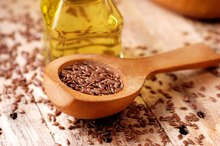Pressure & Fullness in the Chest After Eating
Pressure and fullness in your chest after eating may be caused by various conditions, such as allergic asthma from food allergies, gas pain or a peptic ulcer. It’s common to develop these symptoms occasionally, but if these symptoms become a common occurrence, you need to talk with your doctor. If you develop severe chest pain, numbness in your right arm and shortness of breath, call 911 right away.
Allergic Asthma
The most common cause of pressure and fullness in your chest is allergic asthma. According to the Asthma and Allergy Foundation of America, about 60 percent of people who suffer from asthma have allergy-induced asthma. This means that after your body is exposed to an allergen, your lungs swell and constrict, cutting off your ability to breathe normally. Common symptoms include trouble breathing, chest pain, chest tightness, pressure in the chest, pain in the chest, coughing and wheezing. Wheezing is a whistling sound that results from narrowed airways.
- The most common cause of pressure and fullness in your chest is allergic asthma.
- Wheezing is a whistling sound that results from narrowed airways.
Food Allergies
Food Sensitivities and Ringing in Ears
Learn More
Allergic asthma that develops from eating is most likely the result of an allergic reaction to certain foods. The most common foods that trigger an allergic reaction include milk, eggs, soy, peanuts, tree nuts, wheat and fish, according to MayoClinic.com. You can have an allergic reaction to any food, not just the foods listed. During an allergic reaction, chemicals are released by your immune system that attack the allergen, causing inflammation and swelling in soft tissues. Food allergies may also be caused by certain food additives, such as aspartame, nitrites and sulfites.
- Allergic asthma that develops from eating is most likely the result of an allergic reaction to certain foods.
- You can have an allergic reaction to any food, not just the foods listed.
Gas Pain
Gas pains commonly cause a jabbing or a tight feeling in your chest. Gas is the result of swallowing air or excessive air that’s created during digestion. Some foods are more prone to cause gas, such as broccoli, onions and garlic. Other causes of gas may include eating too fast, drinking too fast and overeating. Gas pains may be confused with indigestion, heartburn and heart disease. If your pain persists or progressively gets worse, call your doctor.
- Gas pains commonly cause a jabbing or a tight feeling in your chest.
Peptic Ulcer
Can Food Allergies Cause Dry Skin and Hair Loss?
Learn More
Peptic ulcers can cause you to feel chest discomfort after taking a few bites of food and may lead to the feeling of pressure in your chest. Peptic ulcers are open sores that develop in the upper digestive system that are typically caused by an infection in the lining of your throat, stomach or the opening of the small intestine.
Related Articles
References
- MayoClinic.com: Food Allergy
- MayoClinic.com: Gas and Gas Pains
- Asthma and Allergy Foundation of America: Allergic Asthma
- Asthma and Allergy Foundation of America: Food Additives
- FamilyDoctor.org: Ulcers
- American Academy of Allergy Asthma and Immunology. Asthma. http://www.aaaai.org/conditions-and-treatments/asthma
- Asthma and Allergy Foundation of America. Allergic Asthma. https://www.aafa.org/display.cfm?id=8&sub=16
- Medscape. Allergic and Environmental Asthma Overview of Asthma. https://emedicine.medscape.com/article/137501-overview
Writer Bio
Diane Marks started her writing career in 2010 and has been in health care administration for more than 30 years. She holds a registered nurse license from Citizens General Hospital School of Nursing, a Bachelor of Arts in health care education from California University of Pennsylvania and a Master of Science in health administration from the University of Pittsburgh.









